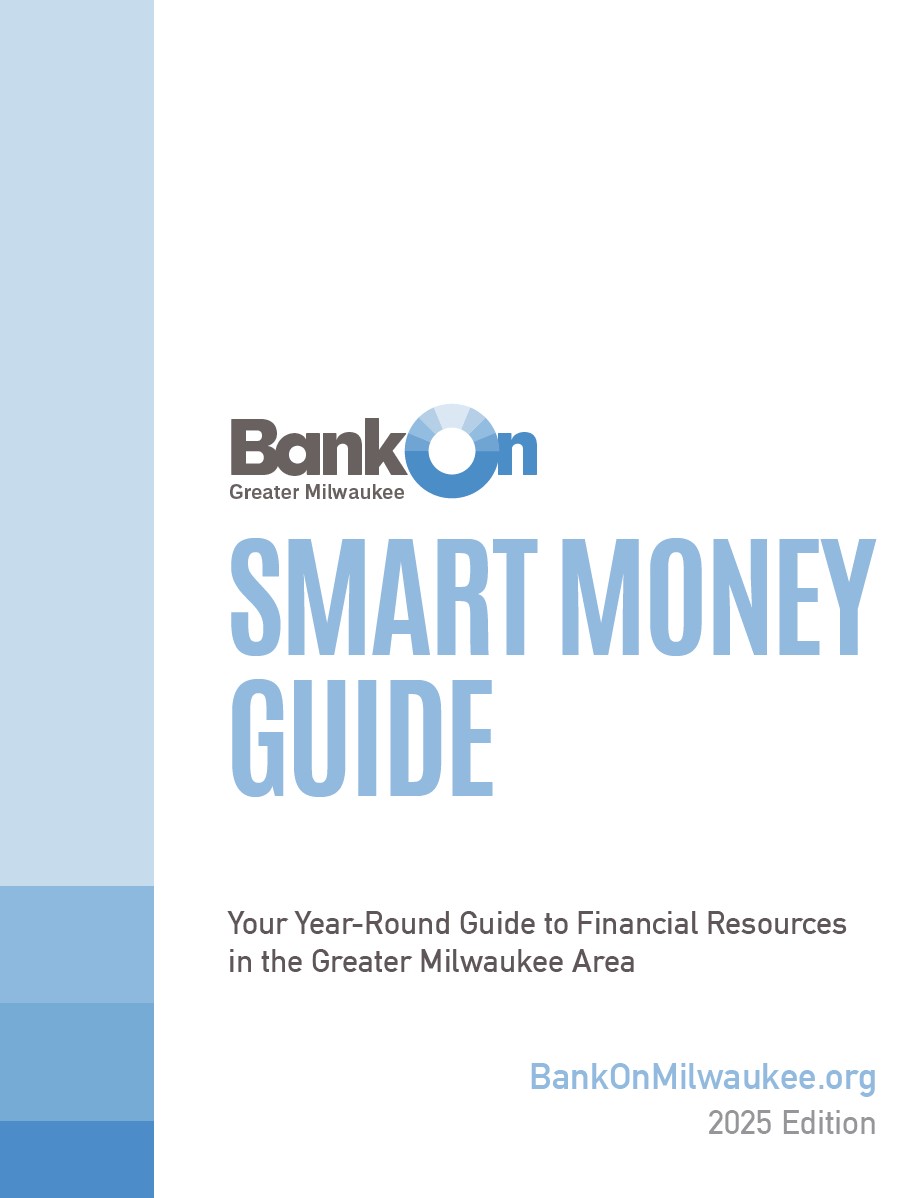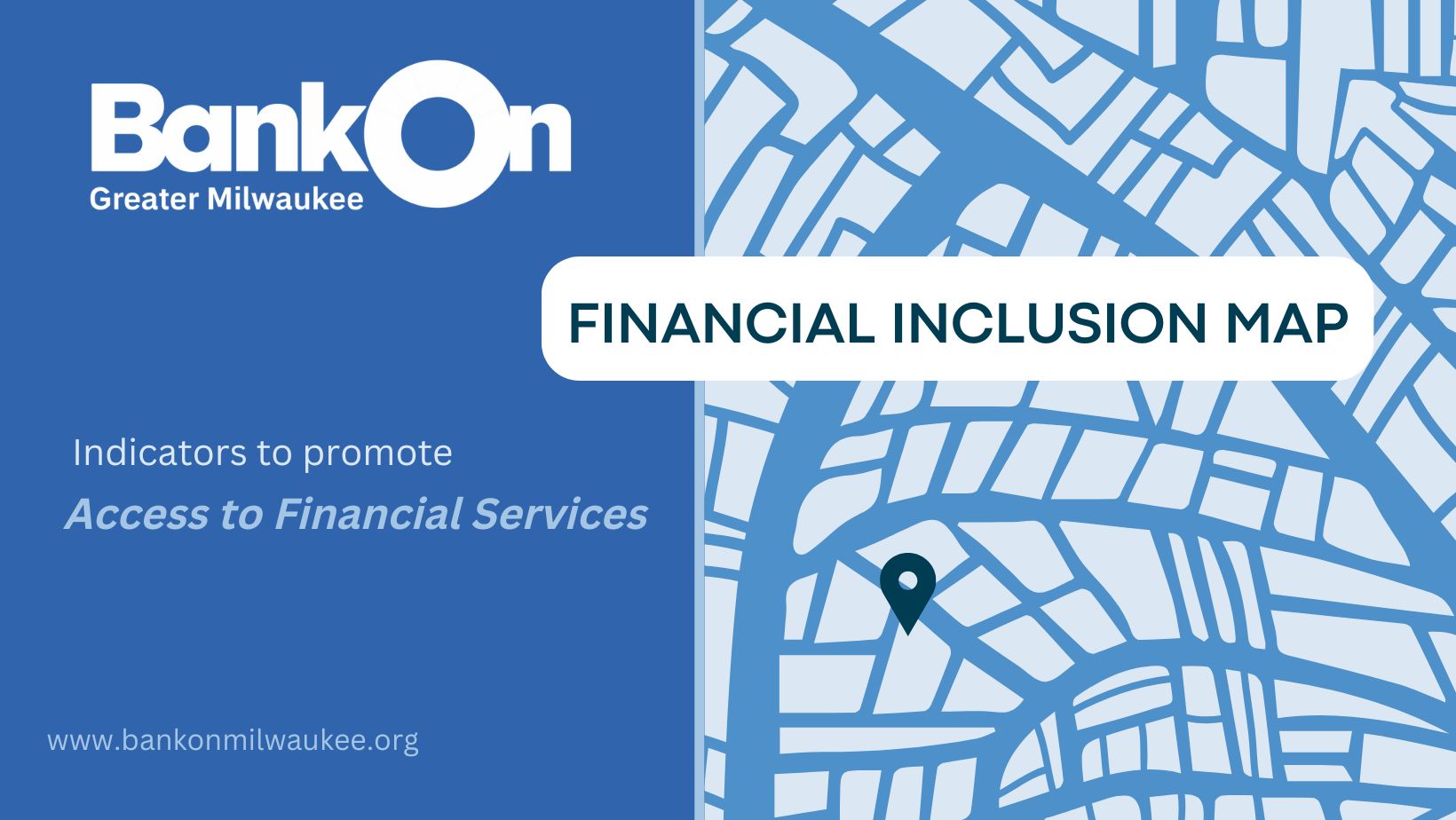Bank On Greater Milwaukee and Data You Can Use have collaborated to create a NEW live interactive map of the Greater Milwaukee area. The Financial Inclusion Map features the locations of financial institutions in the Greater Milwaukee area, specifying whether or not they offer Bank On certified accounts. It further shows the number of certified accounts that have been opened in Milwaukee County in 2023 by ZIP code.
The map shares local data including population by race and ethnicity, persons with disabilities, household income, household vehicle access, employment, and linguistic isolation.This data comes from the U.S. Census Bureau’s American Community Survey 2018-2022 5-Year estimates and 2023 Bank On National Data Hub set.
What is the purpose of the map?
Bank On Greater Milwaukee wanted a tool that could display the gaps in our community when it comes to accessing financial products and services. It also serves as a tool for financial institutions to better understand which populations are being underserved, and how to meet their obligations as partners via the Community Reinvestment Act (CRA).
Our partner, Data You Can Use, has created and hosts a number of interactive maps that further their mission of advancing community access to data and the skills needed to drive informed and equitable decision-making. We knew they’d be the right partner to help us develop a mapping tool that achieves these goals.
In particular, the Financial Inclusion Map highlights the number of unbanked individuals, where they are, and how low-income individuals are most negatively impacted by a lack of banking access. Individuals who are unbanked are defined as individuals without a banking relationship which includes a checking account or credit card.
The Financial Inclusion Map showcases data such as:
- Number of Certified Accounts opened in 2023
- Concentration and location of households with low to moderate income
- Where bank locations are within the City of Milwaukee
- Population demographics
- Concentrations of linguistic isolation
- Households without vehicle access
- Intersectionality between all metrics such as low-moderate income households and a lack of banking options
Implications for this data include demonstrating support for efforts that ensure people have access to safe, affordable financial products and services such as maintaining branch locations in underserved areas and connecting people to certified accounts.
Who is the map for?
This map is for multiple audiences including:
- Consumers who are looking for a bank branch nearby
- Consumers who are looking for a certified banking account
- Consumers who are looking to understand the financial landscape of their community
- Community partners who are looking to understand the needs of low-income individuals as it relates to accessing financial services and products
- Financial institutions who are looking to address inequity
- Financial institutions who are looking to understand community needs
- Financial institutions interested in working in collaboration with Bank On Greater Milwaukee
- Decision makers and elected officials looking to understand Milwaukee data related to banking access and low-income individuals
- Decision makers and elected officials looking to create policies
“This map shows many financial deserts across Milwaukee and is a tool to fight inequity”
Constance Alberts, Bank On Greater Milwaukee Program Manager
Future Considerations
As part of our partnership with Data You Can Use, the map will be updated with new data as it becomes available. Bank On Greater Milwaukee will continue working with coalition members and partners to strategically address barriers to banking access.
Some of our next steps will be to support efforts that help vulnerable people access financial products and services that meet their needs and help them become financially healthy.
How was it created?
Bank On Greater Milwaukee’s Advocacy Workgroup began working in 2020 to develop a tool that could show gaps in accessing financial products and services in our community. In 2022, we launched version 1.0 – the “Advocacy Map” with help from workgroup members and volunteers skilled in data mapping.
In 2023 we realized the need to find a long-term home for the map, which could also offer more capability and updated data. Bank On Greater Milwaukee’s host agency, the Urban Economic Development Association of Wisconsin (UEDA) secured resources to bring in Data You Can Use to update the map, which was completed in December 2024.
Now known as the Financial Inclusion Map, this tool was created by Data You Can Use in partnership with Bank On Greater Milwaukee, with funding support from a City of Milwaukee grant of Community Development Block Grant funds. It will help inform our work and commitment to financial inclusion for all in our community.
How You Can Help
Questions or interested in getting involved?
Email Constance Alberts, Bank On Greater Milwaukee Program Manager at constance@uedawi.org
 A comprehensive resource for anyone looking for help with their personal finances. In this guide you’ll find information on a wide range of topics, plus trusted resources that can help. And be sure to scroll down to access specific topic pages.
A comprehensive resource for anyone looking for help with their personal finances. In this guide you’ll find information on a wide range of topics, plus trusted resources that can help. And be sure to scroll down to access specific topic pages.





 (414) 562-9904
(414) 562-9904
 1915 N Dr. Martin Luther King Drive
1915 N Dr. Martin Luther King Drive